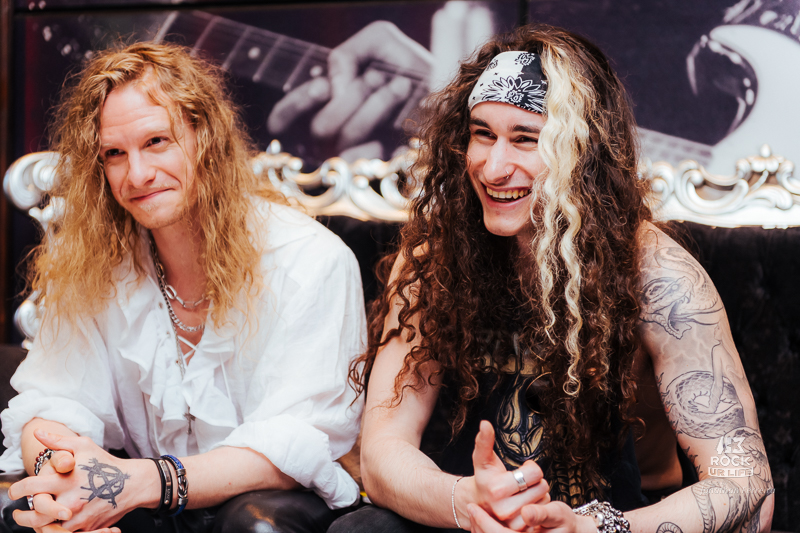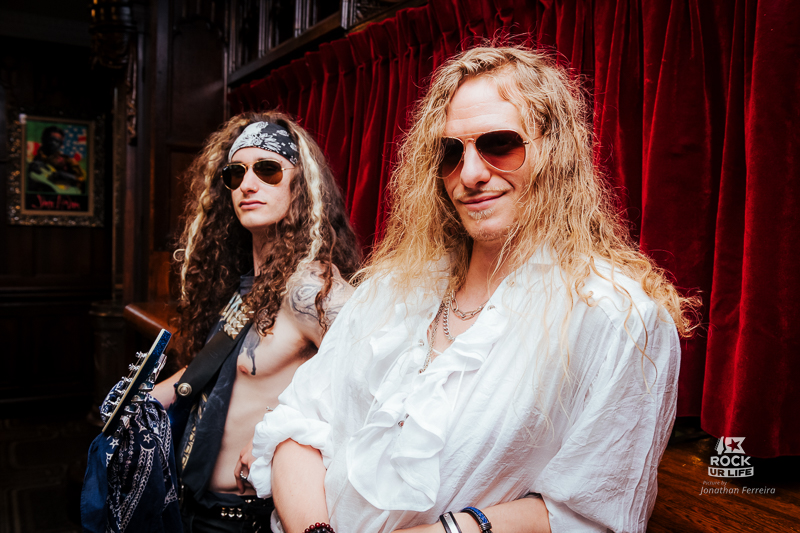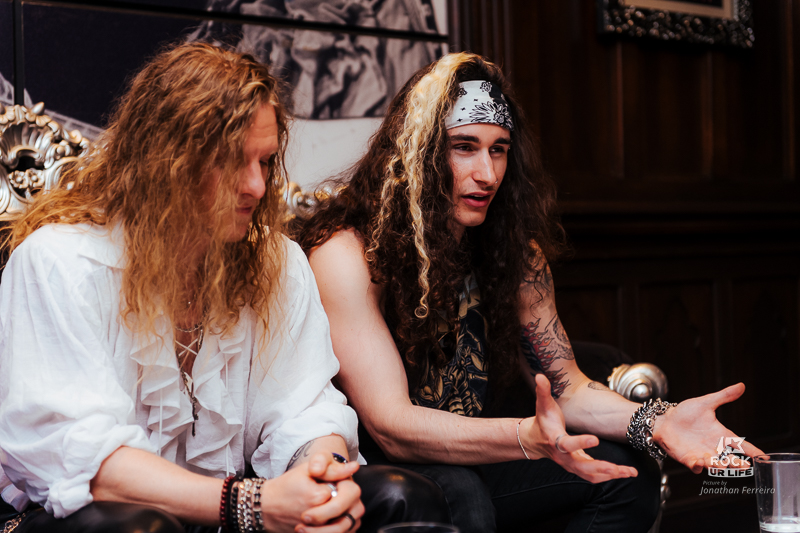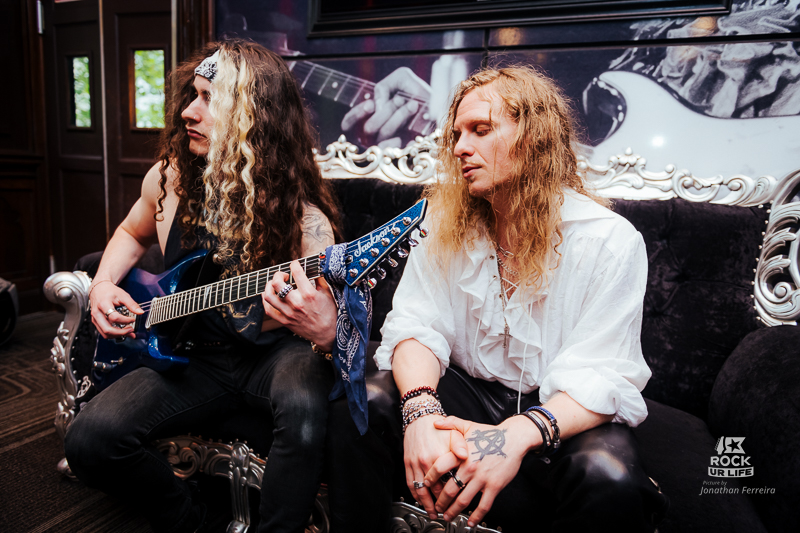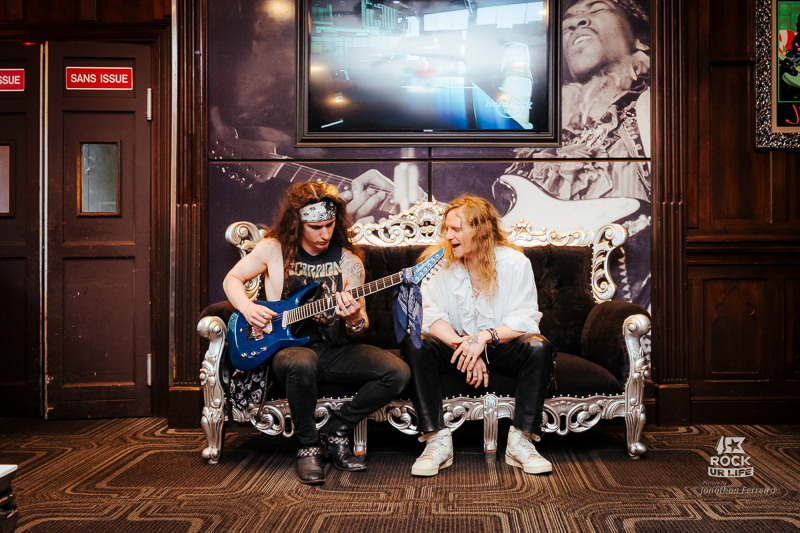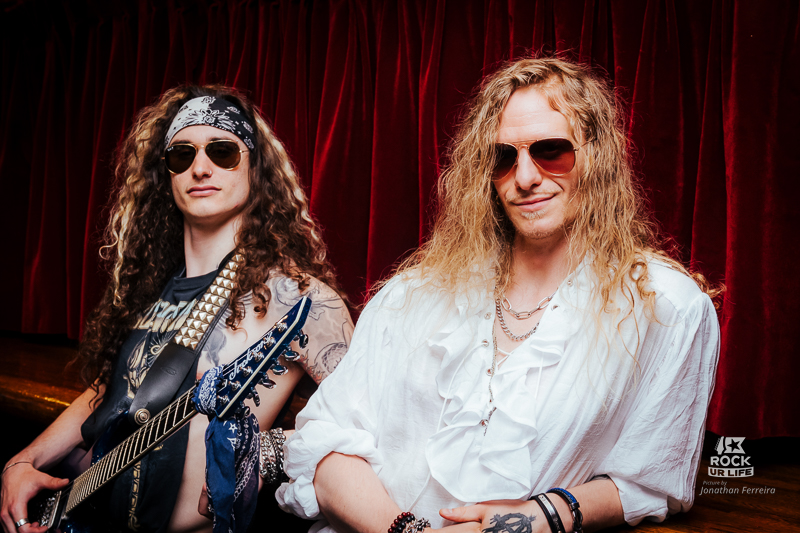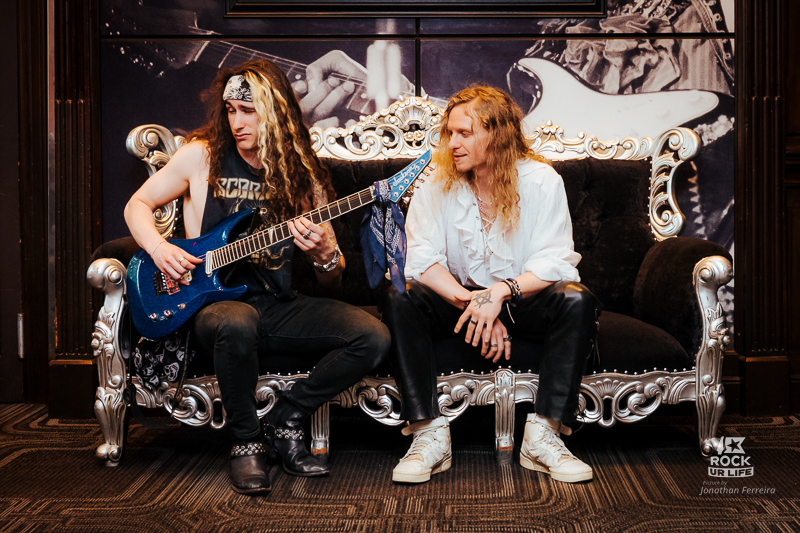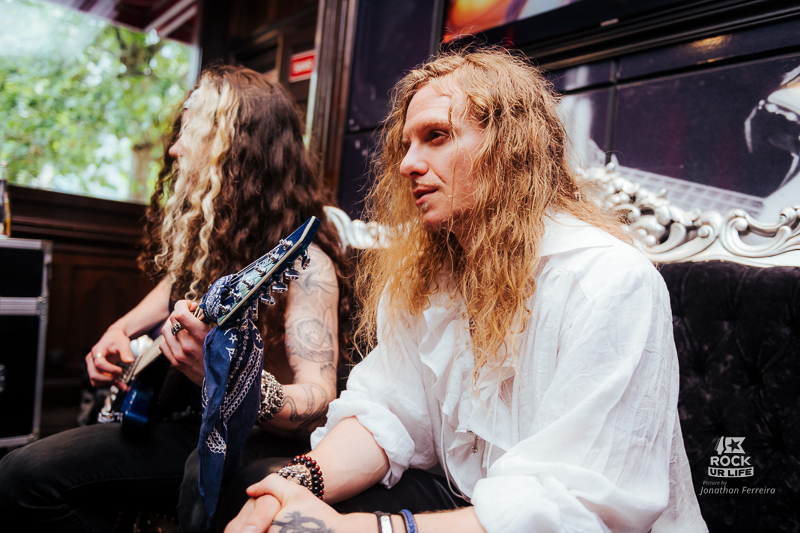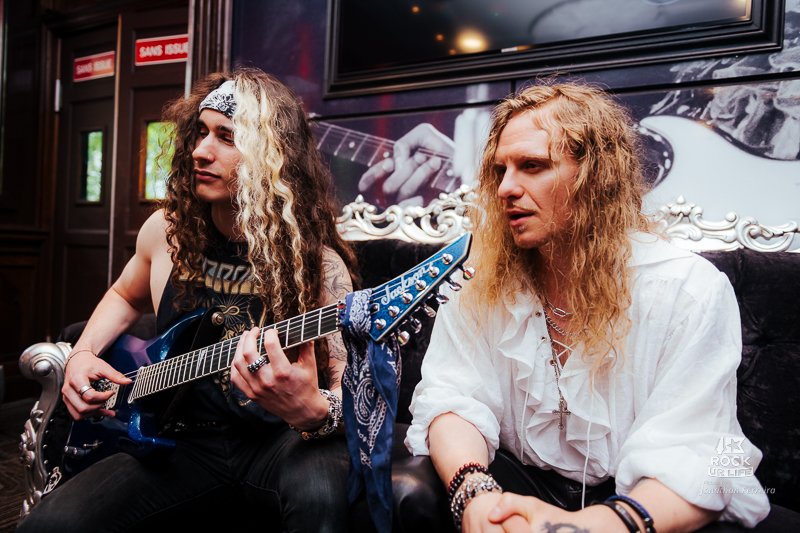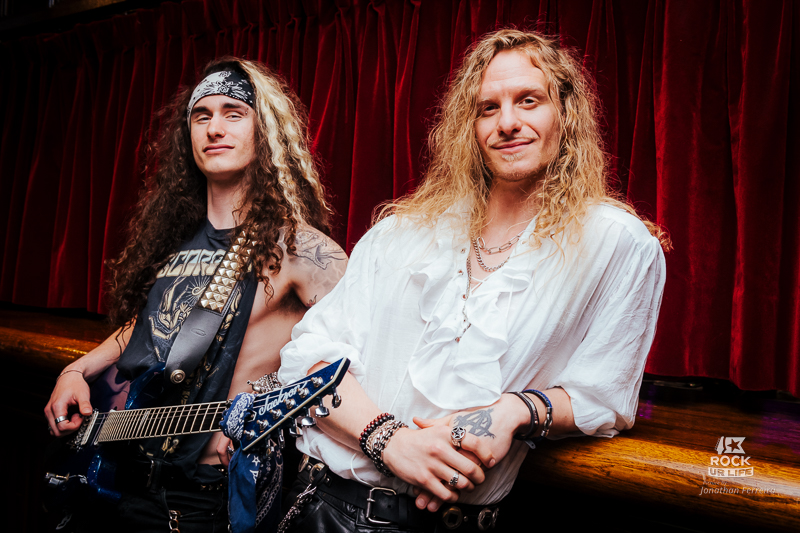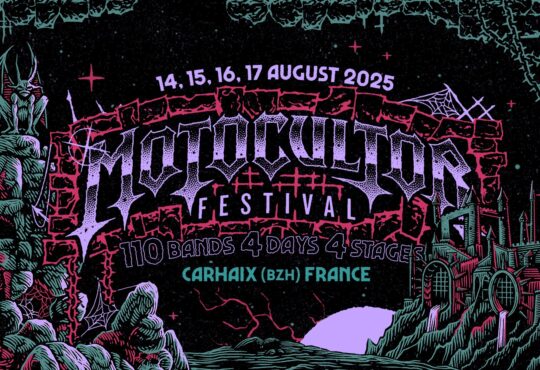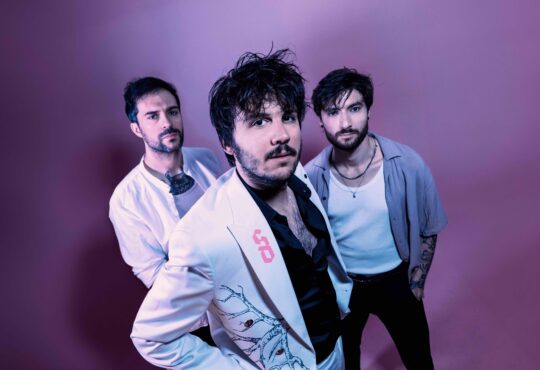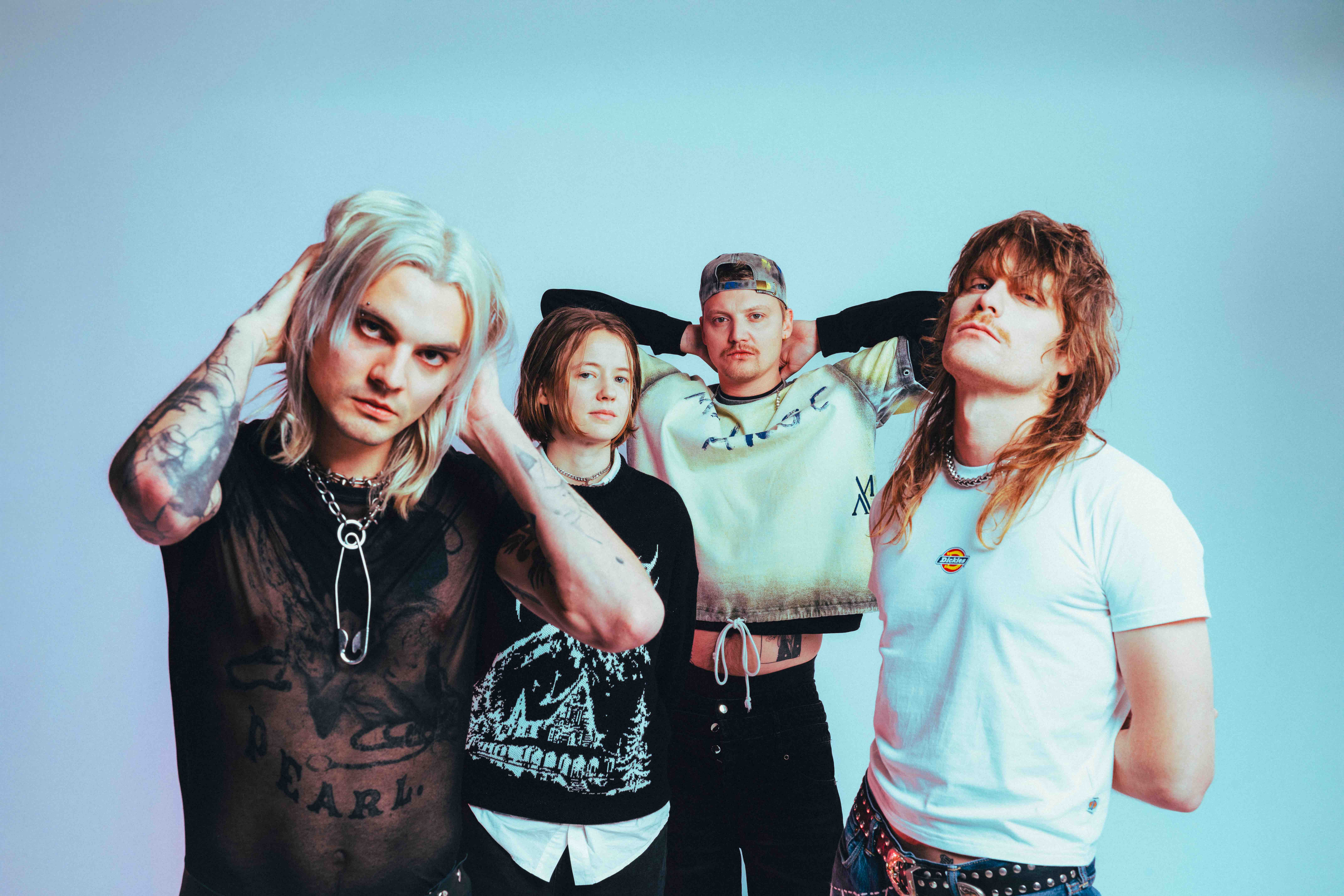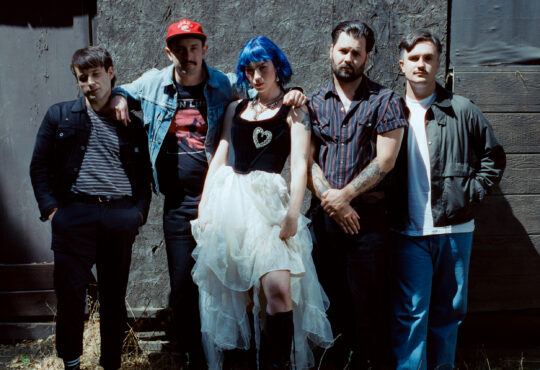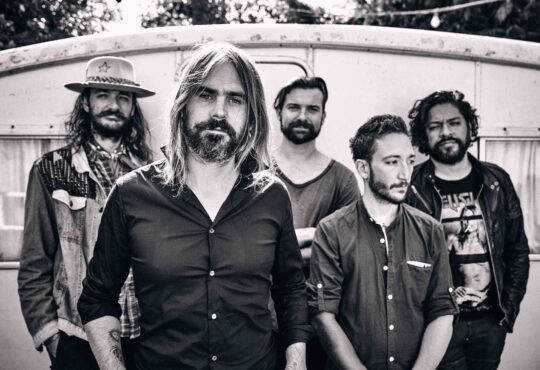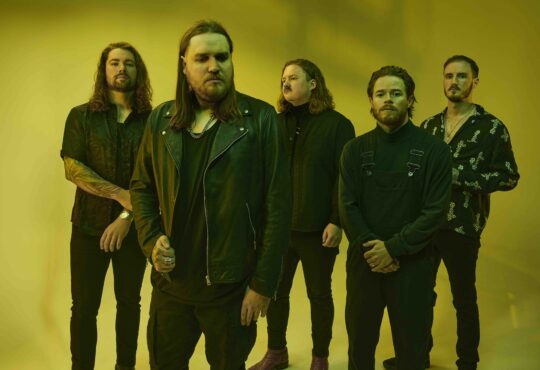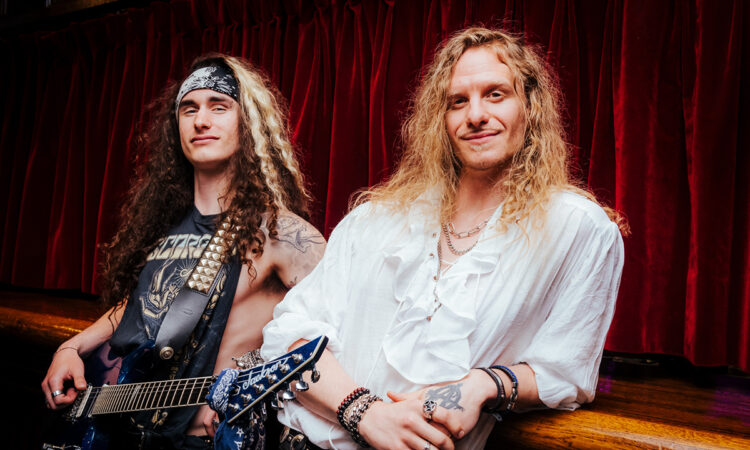
Just a day before their first-ever Parisian appearance at Les Étoiles, RockUrLife caught up with Leo Unnermark and Parker Halub, the duo forming Wings Of Steel, promising newcomers to the US heavy metal scene, here in an attempt to conquer previously uncharted Parisian territory.
You’re Wings Of Steel. You’re a freshly-formed American band. You released a self-titled EP in 2022, and last year you released your debut album Gates Of Twilight. So first of all, congratulations. The album is awesome, and the EP is as well. It really took us on a journey; we loved listening to it, and we loved writing about it. So this is your first time in Europe as a band. You’ve been to Germany, to Belgium, and now France. How have you found the crowds and the concerts, and have you been able to spot any differences with American crowds, for example?
Parker Halub (guitar): Well, I mean, I’ll just say it’s been… before we came here to Europe, Wings Of Steel as a band hadn’t really played too many shows. And we’ve been building up with the album and everything, but we really didn’t have a lot of expectations coming out here. Well, we’ve never played here, and if somebody shows up, that’s fucking awesome. But so, the first two shows we did here were festivals. It was No Playback Festival and Keep It True Festival, both in Germany. And they put us on; we were the first band on for these, and we’re thinking: ‘Okay, it’s the second day of the festival, it’s pretty early, everybody’s probably hungover or still sleepy or whatever‘…
Leo Unnermark (vocals): Or got lost, or something.
Parker: Yeah, or who knows, you know? But we go, we get out there, there’s a few people there. I was like: ‘Okay‘, you know? And then we start playing and by the time we’re on the second song, third song, it’s like… the hall is filled.
Leo: I remember, he had a long solo, and I tend to walk off stage and get a refreshment or something. And when I came back out, it was like a new place. And it was full. I’m like: ‘That’s crazy, what the fuck happened, what did you do, man?‘ (laughs)
Parker: So in summary, I’ll say we’ve really been blown away. It’s been… It’s been fucking awesome. And also, I mean a lot of people that have come to the show are people who’ve been following us since we started and to actually meet these people in person has been really cool too, so.
Leo: I think, on the note of America, like you mentioned, I think it’s a little easier here in the sense that you have more festivals where people can actually gather. We have that in America too, it’s just that it’s further apart, and it’s also a little more difficult, more scarce. But I think, you know, our American crowd, our European crowd, they all seem to kick ass to me.
Parker: I mean, I will also say too, we hardly… I mean we only… the actual, physical audience, we only know how that is in L.A. And being that, like, our first three shows.
Leo: Right.
Parker: So, we probably…
Leo: But those were cool, dude.
Parker: We’ll have better insight into this question once we’ve toured in the U.S. a little more and met a few more audiences.
Yeah, okay. We’ll ask again another time. (laughs)
Parker: Awesome. (laughs)
So, you two met studying music in L.A. in 2019. Can you tell us a little bit more about how you formed the band, how you clicked musically and how all this came together?
Leo: Yeah. So, yeah, we met back in 2019, while studying music. And, uh… I remember seeing this guy walking around the hallways, you know. He was roaming around, he had his jeans and his fucking… his chains and vests and stuff.
Parker: Probably wearing this shirt. (laughs)
Leo: Yeah, probably wearing that shirt. (laughs) And, I remember thinking to myself: ‘Well, you know, I came out here with the intention of starting a band, I’ve been here for quite some time now, and I haven’t come across a single, like, metalhead, or like, hard rock dude. At all.’ So, I decided to hit him up. I went to a few of the, like, stuff that he played.
Parker: These little, like, performance workshops where you show up and you play a song.
Leo: Yeah. I heard him play. I think it was “Aces High”? Iron Maiden?
Parker: No, no, no. It was “War Eagle’s Day”.
Leo: “War Eagle’s Day”. Even better. Yeah, absolutely. But it was Iron Maiden.
Parker: Yeah.
Leo: And he killed it. And I was like: ‘All right, this is it. I’m gonna hit him up‘. I sent him a message on Instagram, and I was like: ‘Dude, you look cool, you sound great, let’s start a band, dude.‘ And so, we met up, we talked, shared some common influences. One in particular, which is the band Blue Murder, where, you know, I…
Parker: This was the first dude in my life who I’d ever met who knew who that band was. I was like: ‘Okay‘. And then suddenly here we are.
Leo: And then we went upstairs, we jammed on “Crying In The Rain” by Whitesnake. Just, you know, tested the waters and after that we knew.
So it started from, like, an Instagram message and just musical connection between both of you?
Parker: I guess.
Leo: I guess you can say that.
So guess this isn’t the first time you’ve heard this but your music definitely recalls classic heavy metal from the eighties, and we think that it’s pretty rare, pretty uncommon, to have contemporary metal bands that embrace that sound so well. ‘Cause, we mean, the biggest metal names you know now don’t really have that sound, that classic eighties sound. Was it a conscious decision, like from the beginning? Like, did you know you wanted to go in that direction, or is it something that came along as you were writing your songs?
Parker: I would say… I would say both, because, I mean, really, maybe more so it was natural, but I think we sound the way we sound because we like the music that we like. You know, I don’t really listen to… at least… I’ve checked out some stuff, of course, but if I’m gonna listen to something, I’m gonna listen to the bands I like. And those bands are typical for that era. That’s just the music we like, and I think the way we sound is a product of our influences and inspirations.
Leo: But at the same time, I think it’s important to make a distinction too, that we’re not trying to sound like anyone or anything in particular. Because I feel like when you do that, you lose a lot of the authenticity behind it, and uh, when you lose that I think people pick up on it.
Parker: Yeah.
Leo: And then it starts, and then you go like: ‘Oh, that’s kind of like a cover band, they sound just like those guys‘, which is probably where it came from in that case. Since we’re not trying to do that, but rather we sit down, and we go about our stuff the way we go about it, and whatever comes out at the end of it comes out. And usually we like it, and it ends up on the album.
So, a follow-up to this question, of course there are other musical influences that can be heard and spotted in your music. We were thinking about maybe a little bit of, you know, blues music in a song like “Leather And Lace”, or, we don’t know, like power metal maybe, in like “Fall In Line”. So our question was: what are your main musical references all genres crossed? You were mentioning you mainly listen to metal, but how much do you think these influences kind of shape the way you write music, and what comes out of this writing process?
Leo: I think we can actually tie this in with kind of our musical development individually. Because I think that’s kind of how it shaped it.
Parker: Yeah. I mean, our range of influences all somehow manifests itself in our music. So I mean… I guess if we do go through the history of it…
Leo: Yeah, just real quick, you know, I think it kind of brings us to that.
Parker: When I was like, 7, 8 years old, I discovered the band Journey, the song “Separate Ways”. It fucking blew my mind. And then when I was 10, I got my first electric guitar, and I discovered Metallica. So both… those two bands, they kind of had like, at least for the most part, it expanded beyond that after of course but, really that’s like the foundational elements of the music that I like, you know. In Journey you have Steve Perry, this amazing fucking voice and these, you know, awesome melodic guitars and big choruses, and a really big sound… and with Metallica you have like this fucking wall of energy, all of these walls and heavy rhythm guitars. Yeah. So I think that really kind of forms the backbone of the sound, and then of course, as we went along in life, you know, I found some other stuff. I really like… One of my alter guitar egos is I love classical and Spanish style. I love that stuff, it kind of sneaks its way in there now and then. And of course, we both really like blues and that makes its way into our sound a lot too.
Leo: Yeah, because I was born and raised on blues. Pretty much that’s it. And there were records around from the, you know, eighties, hard rock and stuff. But it wasn’t until a little bit later when I transitioned into like seventies hard rock, heavily blues-influenced seventies hard rock, that I kind of realized: ‘Wow, this is like, this is blues, but it’s got more power to it.‘ And then that led on to even more heavier stuff, just translated into the eighties, with Judas Priest and all these bands. But there was still always that blues influence behind. So yeah, I think when you take these two approaches and combine them, it makes a lot of sense, and the result is this diverse kind of songs. And then, you listen to stuff that’s beyond the realms of heavy metal and hard rock. I’ll listen to some stuff that’s way out there as well, that’s in no way contemporary, right, and we include stuff like that too, because ultimately we’re here to create, you know? And why only do stuff that’s been done when you can do whatever you want?
Parker: But it’s not… I mean, I will say too, it’s not necessarily something that we consciously make a point to do. You know, I’m not gonna constantly, like, make an effort to, like, shove this one weird thing that’s a totally different style into a song. You know, if we’re writing the song and then we get to this section of ‘What are we doing?‘ ‘Oh, maybe we try that‘, and we try it and think: ‘Well, this is amazing.‘ I think it’s really a more organic process. It’s not necessarily something that’s calculated.
And, another aspect, besides the music that reminded us of power metal, was maybe like the aesthetic around the album, and the cover for the album. So can you tell us a bit more about the intention and the inspirations behind the cover and how it came out the way it did?
Leo: I think we wanted something that reflects the music in the sense where there’s… there’s contrast, right? You know, you have the high highs, you have the low lows, the heavenly aspects, the hellish aspects… because at the end of the day, that’s kind of what our songs bring to the table.
Parker: It’s a journey.
Leo: You know, and so we try to illustrate that and then the styling is this… I remember this one time we were driving through the Santa Monica Mountains, right? We’re going to go to the beach and then on top of this hill, you got the sun right behind the hill. And on top of the hill stand these two stallions, one white and one black.
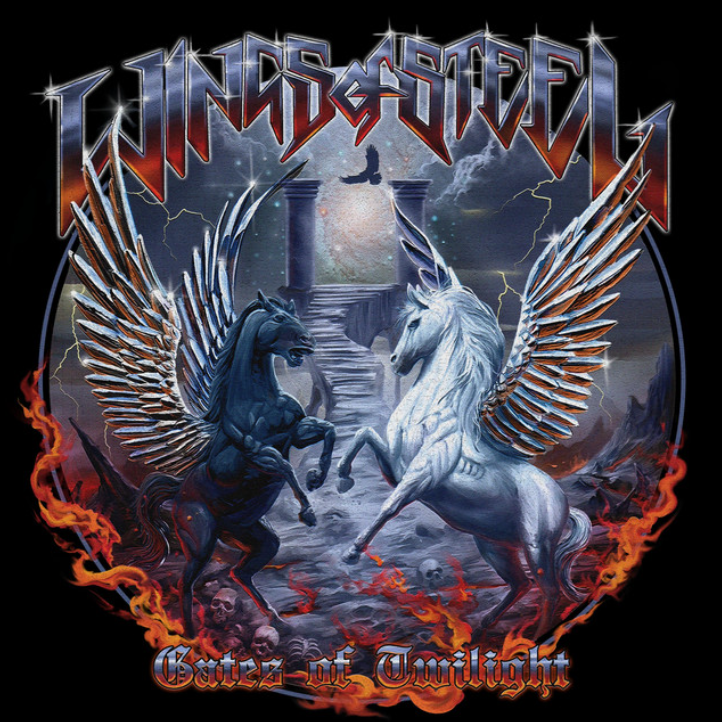
Oh wow, that’s like real-life inspired.
Parker: I would say partially, because… well, truth be told, I don’t remember which one happened first. (laughs)
Leo: I’m pretty sure that we had already thought of that concept before, and we had something about the stallions. Which… like this, it looks great, but now it was so… obvious.
So, there’s a very nice exhibition in Paris currently that’s about metal music and it kind of presents metal music in a way to make it more accessible to a larger audience, kind of afar from the stereotypes that you can usually hear about metal music. So you’re a metal band. How do you view metal, as a counter culture or subculture of rock music? More generally, how do you position music in the rock music more generally?
Leo: Generally speaking, I hate definitions. When you’re categorized as this or that because it’s true, but it doesn’t cover the full extent of it, right? As a creative artist, I think you’re always getting new influences, always getting new inspirations, and who’s to say what type of style that is really, right? That’s all based on history. And when you base all of that around a certain amount of bands then you’re always going to sound like that band, or that band… and it doesn’t…
Parker: But it’s especially in the metal world. You know, we really love subcategories and we get: ‘Oh, you guys are traditional heavy metal, or power metal, or neo-metal‘, or whatever. I totally get it, you know, but we don’t see it like that. But to answer your question though like I guess on a broader, like, cultural sense, I get it. I mean, if you look back at the history of rock music, it was kind of going against the grain of what society wanted you to do, I think. I think that I mean, Leo and I as people, you know, we don’t do things the way other people do things. We don’t live the same lives that other people live. We do things the way we want to do it, I think. And I think the… you know, metal music and rock music… it kind of embodies that spirit a little.
Leo: And just to give you something too, that’s kind of what a wing of steel represents per say, because the wings of steel, they allow you to fly against the wind and not only… We’re trying to throw a paper airplane into the window. Whenever you see a bird trying to fight the wind, they’re just like, doing this [ed. imitates a bird flapping his wings]. But they’re not moving, right? I feel like that’s a lot of people.
That makes sense, we see the image. So, diving a little deeper into the writing process, well, there’s only two of you, but your songs sound so massive, and there are many instrumental tracks. And they’re very out there, in the best way possible. How do you start? Is it a riff? Is it a solo? Is it a vocal melody? What’s the beginning of a song and how do you build on that beginning? Where does it start and how does it evolve?
Parker: It evolves. I mean, really, the process, the songwriting process is actually never ending because Leo and I personally, we’re always coming up with riffs and ideas, and melodies, and… Because we live in the day and age where we have phones, it’s great. Yeah, I’m sitting there, like: ‘Oh, this is tasty. Okay, perfect, Got it. It’s on this.’ I mean, there’s hundreds, or probably thousands of these ideas, that we just have sitting around, and I mean, I think the good ones stick. They stick in your head a little bit. But I mean, sometimes, you record something, you don’t even think about it, like: ‘What is this?‘. But, but yeah, usually it starts with a riff, or a melody, or a progression… And then the whole song from that point typically just writes itself. I mean, we never really sit down with a cold, hard intention. I mean, sure, if we want to, you know, write a song that has that kind of sound, or has this, we keep that in mind, but, really, at the end of the day, the song always just kind of writes itself. Like, we don’t look at music like a math equation because it’s not, but it’s similar in a sense that you have an algebra, and you know… but you don’t know what B and C are or whatever. And… what… I don’t know, high school is a little while ago. (laughs) Point being, if you know what one of the variables is, if you have the right equation, you can figure out what the others are, and so even though we don’t look at music in an analytical sense, it’s similar in a sense where if you have this one riff, or whatever, the song is going to show up behind it.
And has the way you work together evolved since you met? Like, the way you made music back then and the way you make music now, has it changed throughout the years or not?
Leo: You know, not really. I think that’s the beautiful thing about it.
Parker: We’re like a fine wine. We just get better as we age. (laughs)
Leo: I think it’s beautiful because it never… Like Parker said, it never came from the standpoint of forcing it and making something happen. It was always just two dudes hanging out with their instruments. And just seeing, you know, hitting recording, whatever comes out right. And then of course, as you go along, you tweak it and stuff. And I think that’s still the process.
Parker: I mean, you know, we’ve grown up, we’ve gotten a little older, a little wiser, you know. But I mean, I think fundamentally, we’ve had it down pretty well from the start. We have our way of doing… it’s not really… I think the good thing about it is it’s not really a set process, it’s just organic and we’re always having fun with it and it’s always cool, and yeah.
Leo: I will say one thing though, which is kind of cool and which I’m very excited about, is that the more you write, the more songs you put out, you hopefully start to develop a sound, right? And that’s something that I’ve noticed with our full-length album. Like, man, there’s actually a sound here. You know, I can hear that this is us. And so now we’re going into writing the next one, which we’re about to do, only you don’t only pick from the inspirations around you, you pick from the inspirations that you’ve already created. So now you’re creating this blueprint for the band.
So, Leo, one of the main elements that make your sound so distinctive is your incredible voice. We were so touched by the way you sing, it’s really impressive. How did it develop? Did you take any singing lessons or was it just like a very organic process? How do you sing the way you do?
Leo: First of all, thank you very much. You know, I think I started early, because I’ve always been singing and I mentioned that I listened to a lot of blues records as a kid. So when you’re a boy and you haven’t gone through puberty, you have a very high range. And so these blues men and women, they were all kind of singing at a lower range, right? It’s very emotional, it’s very dark. But I was always singing it, an octave above or sometimes even two octaves. And so I think transitioning through my puberty, I was so used to doing that that I kind of maintained that aspect of my voice. In terms of lessons, I’ve had a few. I think the main focus that I’ve found that a lot of teachers focus on, is like, the anatomy of the body, and like how things work in a literal sense, and from like a book stamp. And I do not believe that’s how you learn to sing. I believe you learn how to sing through experimentation, right? Maybe you want to try and imitate this guy, but then you have to tweak very subtle things. You don’t have to define what they are, you just have to try. It doesn’t feel good? You take note of it and with enough repetition, as with any instrument, you improve, you know, and then you just gotta stay aware and make sure that you feel good.
It’s very interesting. And Parker, obviously, your music, you know, leaves a lot of room as well for guitar solos, they’re incredible as well.
Parker: Thank you.
So how do you write these solos? Is it, like, a conscious process of you sitting down with your guitar and trying out techniques and melodies, or is it through improvisation?
Parker: I mean, I really think it comes to life in the similar light to how songs come to life. Typically, sometimes if I have a really strong melody, I can start with the lead and then put the rhythm and the band behind it. But I typically do like to have the rhythm guitars and the bass and the drums in there before, so I have something, I have the background, because I mean, for me, it’s just like a… if you drew… there is a big white table right here. If you put a black circle right there, and filled it in, is it a black dot on a white background? Or is it a hole in the wall? Or is it the inverse of it? But, my point with that metaphor being is… like the black dot is the solo, it’s nothing without the back. And so just, I mean this is the same thing with vocals too, really, but the background and what’s happening in the back is just as important as what’s happening in the lead. But yeah, but the solos themselves, you know it always starts with some kind of improvisation and just I get to that part of the track and, let’s go. And sometimes, it’s literally like the first thing I write. Not often, but I mean like an example of the main solo for “Into The Sun” that you hear on the last song of the Gates of Twilight album, that solo was the first thing I recorded when I was writing that song. Which is really cool. But there’s some other ones.
Like, you know, “Lady Of The Lost”, that song is a big empty canvas and you can do a lot of different things on it. You can say a lot of different things. So, I remember, you know, I think I sat down on it, I laid down something and I tried several different things. So sometimes it’s a journey, sometimes it takes a little while. I’ll typically… I’ll improvise it and then I’ll kind of figure something out. I’m gonna go: ‘Okay. I like this lick here. I like this lick here.‘ and I can kind of like compose is and put it together. That’s typically what happens. So sometimes it takes five minutes. Other times, I spend a couple hours on this solo.
Leo: And it’s cool, because we have each other’s inputs. Whenever I’m done with like, vocal melodies and stuff, I’ll run them by Parker. Most of the time, you know, it’s great, sometimes you’ll be like… you know, ‘Change this little thing. Go higher.‘
Parker: It’s like: ‘Hey, no, change how you’re pronouncing it. You don’t sound like you speak English. And you gotta fix this.‘
Leo: (laughs) Thank you. There’’ sometimes… in reverse, you know, sometimes, he’s not entirely sure how to go about a section, and I might have like a rhythmic idea which will then spark another melody, and that’s it.
One of the aspects that makes your music so emotional is how well combined these rhythm sections and the solo parts, whether they’re vocal or guitar, everything combines so well and makes something really epic and really emotional.
Leo: Awesome.
So let’s talk about concerts a little bit, because obviously, they’re a big part of music and metal music. Do you recall a particular concert where you went like: ‘Wow, this is what I want to do with my life‘? Was there ever a moment like that for you?
Leo: I think we’re experiencing it right now. You know, as Wings Of Steel, we haven’t played a lot of shows. And sure, there’s been a show or two from my former days, before Wings Of Steel, where the place has been packed, everyone has been screaming with their throats out and you know it’s just been, wow, there’s nothing but energy. But I think the biggest things in my life this far, I’m experiencing right now on this tour. Festivals, and the people especially. Like I said earlier, given the fact that, you know, people haven’t even heard of us before and they get to experience it and you get to experience them, and you get to experience them experience your music for the first time, that’s special. And that’s like a once in a lifetime thing, especially during this tour.
Parker: Yeah. I mean I agree with you, but thinking about it a little bit… When I was 13 years old, I played at the 8th grade talent show and I wrote my own song. I had, like, a buddy who could kind of play the drums, and a buddy who could kind of play bass. So, I kind of like, you know, tried to get them to play something, they’ll get it figured out. But yeah, I remember just being there and playing, I was like: ‘This is fucking so cool‘. And I was like: ‘Yeah, this is what I’m gonna do‘.
And do you like- well, maybe you haven’t done enough concerts to kind of realize that, but some bands sometimes say that they approach their songs differently once they take them on tour with them. So have some songs changed, We don’t know, meaning or have you changed your perception of certain of your songs, thanks to live performance? Or do you have any favorites to play live? Have you songs kind of changed and evolved as you take them on tour, and as you see the crowds’ response, and how you feel on stage?
Leo: Yeah, I think certain things that have changed along this tour is the way we place the songs, the order of the songs, and stuff like that. Another thing that I feel like it’s become more apparent is that some songs they want to be a little faster when you play them live. And it’s not necessarily a bad thing at all. It’s just a natural kind of experience. Some songs, you’re not supposed to rush at all. You’re supposed to let them take their time, and I think it’s something you figure out as you go about your shows.
Parker: For me, it’s almost the… you know, something like, the painting is coming out of the wall, and coming into life, because when you play live, and really, I mean… Yeah, if you have a great stereo system, of course you’re going to get that effect too, but I mean, when you’re there in person and you’re playing live, it’s almost like the sound becomes like 3D. You can feel the depth of the sound. You can feel the bass and drums and the guitar, and I think most importantly, you feel the energy. And not just, you know, when you go to a show and you feel the energy from the band, but when you’re playing, you feel the energy from the audience, and I think it’s… I mean, for me, that’s really what kind of mindblowing.
Leo: Another thing that’s really cool is, when you’re playing live – and I love this – it’s the whole approach to it. You don’t sing or maybe play the same song the same way night after night, right?
Parker: I was just gonna say.
Leo: So I find myself changing a lot of like, melodies… you keep the hooks and and stuff, obviously, but it’s fun. You experience your own songs for the first time every time you go to play.
Parker: You know, you’re free with it. You’re not just going up and there and reciting something, you’re going out there and you’re playing, and I think when when you play with it, it’s cool to change things a little bit. You know, you typically keep the structure of everything fundamentally the same, but you know, you throw in little fills. You hit this note a little differently, or…
Leo: Maybe you add a section, maybe you add some kind of solo, you know.
Parker: Yeah. So it’s little things like that, but I think that’s what really really makes the live experience, especially.
And do you have any favorite song that you have played live, that really felt good on stage?
Leo: Yeah. So I think, the one where I’ve like noticed, I mean they all kind of do things to the atmosphere, but one in particular is “She Cries”. Because I feel like it invites everyone to a very emotional space within themselves. And then you have everything around you that’s all kind of sitting in the same boat with you. And then when it kicks up for the next gear, it’s almost like you can let loose even more, and pour yourself out. I think that’s been a great experience.
Parker: I mean, that one’s good. The other one I really love playing live is “Into The Sun”. That guitar solo… it’s always super fun, and it’s so dynamic, and calms down… There’s like nothing but the guitar that creeps up a little bit and then it builds, it builds, and then it’s like full speed. So it’s a lot of fun to play. I really like it. But you know, I really love playing all the songs, and like, we’re up there on stage and we’re playing like it’s a mystical experience. You don’t have any conception of time. You’re just there. You’re with the energy. It’s really, really good.
We haven’t checked out the setlist because we don’t want to spoil ourselves. Like we want to be fully surprised tomorrow.
Leo: There are some surprises, and I think you’ll be happy.
So, of course you’re still a fairly recent band, but have you thought about the future? Any particular objective on where you want to go or are you kind of, like, more going with the flow and seeing what happens?
Parker: Well, I’d say, I mean if we’re talking like, big, big picture, you know, our goal as a band is the same as when we started as it is today. It’s… we want to go and write, and put on the best live shows, the best music we possible can and continue to take what inspires us and share that with people. And not just share with people, but share with as many people as we possibly can. And you know, we want to go and play in all corners of the globe.
Leo: Yeah. And on a lesser scale but more pressing, I would say that, you know, we are band, we write music, but we’re also a business since we’re independent and we run everything ourselves. We do set up more short-term goals and stuff like that. So, you know, plans right now is, we’re going to wrap up this tour, we’re going to hopefully do a U.S. tour later this year, and then spend the last quarter writing and recording the next album, followed up, then, by another tour. That’s kind of like, how far ahead we are.
Parker: Yeah. About a year or so, yeah.
Leo: Yeah.
Parker: You know, it’s kind of hard at this stage in the band. It’s a little hard to plan that far in advance because stuff comes up.
Last question: our media is called RockUrLife, so what rocks your life?
Parker: That’s a great question.
And it can be music-related, or not. Like, what’s the first thing you guys will do after, what’s the one thing you look forward to doing back home, that’s pretty blacklisted?
Leo: You know, it’s…
Parker: It’s not legal in this country.
Leo: ‘It’s not legal in this country‘? (laughs)
We’ll just have to black that out. (laughs)
Leo: Yeah.. Not, but, I mean, I gotta say, some of the greatest, highest that I’ve had have been completely sober and it’s going on by being on stage right now. That’s all I want to experience.
Parker: Yeah.
Leo: And maybe that would change if you did it for a couple of months, who knows. But right now, that’s what rocks my life the hardest.
Parker: Yeah, I think I agree with that. Just seeing that, and being on stage and feeling the energy… that’s the best.
Leo: And meeting the fans, honestly, because there’s just so much love. It’s like an abundance of love. And you get to experience it on stage, but also up close and personal. These people that are taking time out of their day to go and watch you and show up to the signing session… They are fucking stoked, and they support you. They buy your merch. They enable us to do what we do and that is also something very special.
Parker: I think that’s the main thing. I’m sure we could list other smaller things, that also-
Leo: Legal. (laughs)
Parker: Yes. But that’s the number one, that’s the top of the pyramid right there.
Website: wingsofsteelband.com



